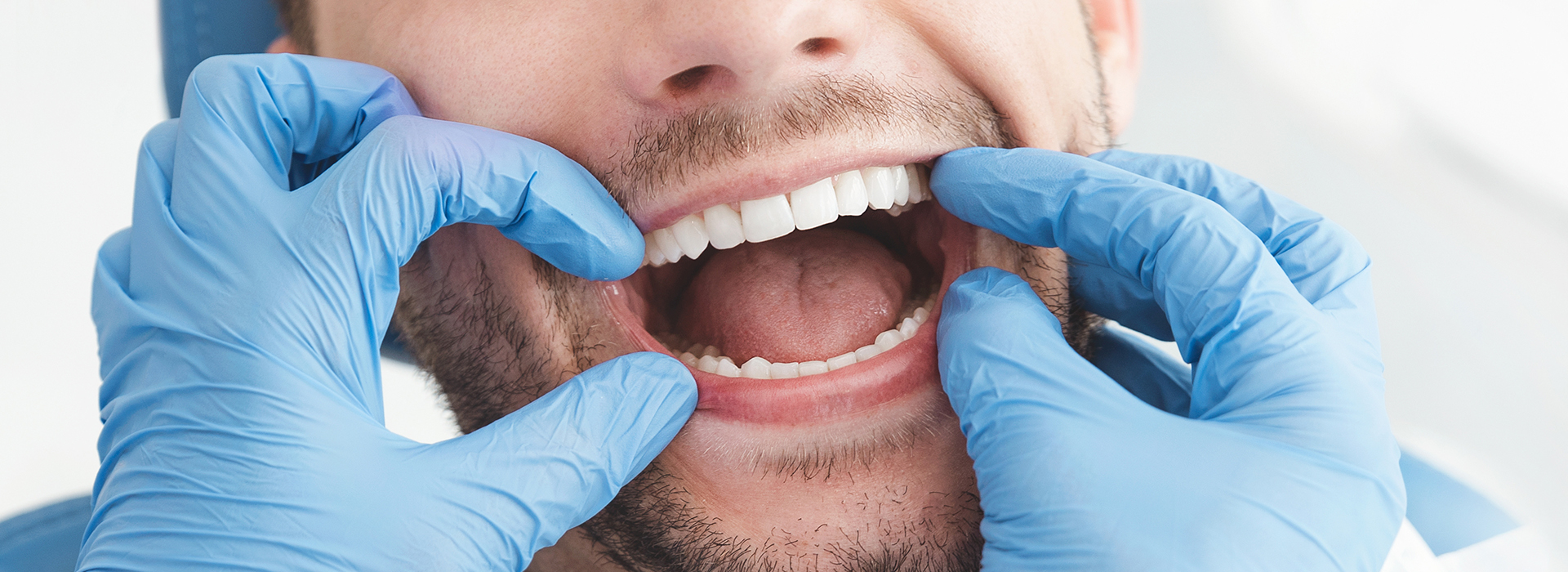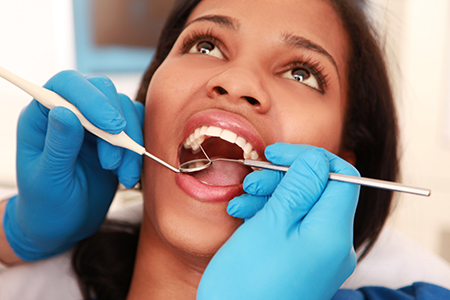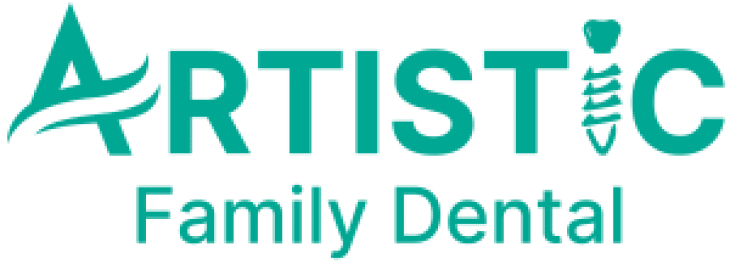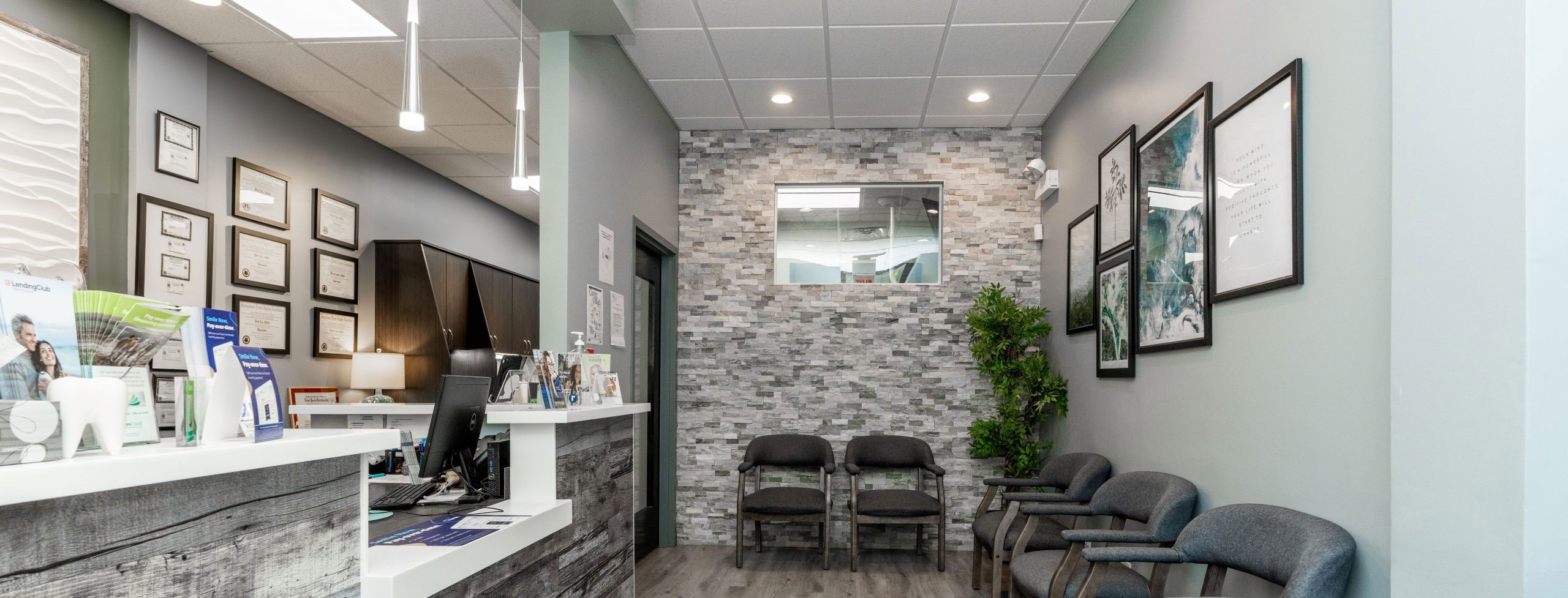New Patients
Existing Patients
New Patients
Existing Patients
New Patients
Existing Patients
New Patients
Existing Patients
New Patients
Existing Patients
New Patients
Existing Patients
New Patients
Existing Patients
New Patients
Existing Patients

At the office of Artistic Family Dental, we take a preventive-first approach to keep smiles healthy and resilient. Regular oral exams are more than a quick check — they are a chance to assess your current oral health, identify early warning signs, and build a personalized plan that fits your needs and lifestyle. Our team combines careful observation, modern diagnostics, and clear explanations so you leave each visit informed and confident about your care.
Your first comprehensive exam establishes a clear baseline that guides future care. We begin by reviewing your medical and dental history to understand any factors that may affect your mouth — medications, past procedures, or health conditions that influence risk. We also want to hear about your goals and any specific concerns so the exam addresses what matters most to you.
The clinical portion of the visit includes a detailed inspection of your teeth, gums, tongue, and the soft tissues of the mouth. We assess bite alignment and jaw joint movement, look for signs of wear from clenching or grinding, and evaluate gum health. If needed, we will recommend diagnostic images to see below the surface where visual exams cannot reach.
Screenings for oral cancer and periodontal disease are routine parts of a full exam. These checks help us identify suspicious changes or early-stage disease when treatment is most effective. After the exam, your clinician will review findings and outline any recommended next steps — from a simple hygiene plan to specialty referrals when appropriate — explaining the reasons and expected benefits in plain language.
We believe the exam is also a teaching moment. You’ll receive practical guidance on daily care, dietary habits, and any tools or techniques that can improve your at-home routine. Our goal is to make each appointment productive and empowering, so you feel equipped to protect your oral health between visits.

Oral health doesn’t exist in isolation — the mouth often reflects what's happening elsewhere in the body. Persistent gum inflammation, recurrent ulcers, or unexplained dry mouth can be clues to broader health issues. During an exam, our clinicians look for these signals and consider them in the context of your overall health history.
Research increasingly shows links between common dental conditions and systemic diseases. While a direct cause-and-effect relationship is complex, identifying oral signs early helps prompt medical evaluation and coordinated care when needed. This integrated perspective improves outcomes and helps prevent small problems from becoming bigger ones.
Some of the systemic conditions that can be associated with oral findings include:
Digestive disorders
Respiratory problems
Cardiovascular disease
Stroke
Diabetes
Alzheimer's disease
Recognizing these links allows us to flag concerns early and recommend appropriate follow-up. If your exam uncovers signs that may relate to a medical condition, we’ll communicate our observations clearly and suggest the next steps so you can pursue the right care without delay.

Daily brushing and flossing are the foundation of oral health, but professional cleanings remove hardened deposits and biofilm that are difficult to dislodge at home. Our hygienists use precise instruments and techniques to clear plaque and tartar from above and below the gum line, reducing inflammation and lowering the risk of cavities and periodontal disease.
A cleaning visit also serves as an opportunity to reassess your home care habits. We offer tailored coaching on brushing technique, flossing methods, and adjunctive tools — such as interdental brushes or rinses — that suit your needs. Small adjustments to technique often yield big improvements in gum health and long-term stability.
Regular checkups and cleanings help us catch changes earlier, when treatments are typically simpler and less invasive. For children, routine visits build healthy habits and allow monitoring of dental development; for adults, they support preventive strategies that preserve natural teeth and overall oral function.
Keeping your mouth healthy is a team effort. During each cleaning and exam, we’ll set practical goals, track progress over time, and ensure you have the information and support needed to protect your smile between appointments.
Imaging is central to a complete oral exam because it reveals structures the eye cannot see. Digital radiographs show the roots of teeth, the condition of bone, and early decay between teeth so we can make informed decisions about care. These images are a critical complement to the visual and tactile components of an exam.
Modern digital radiography has significant advantages over older film-based methods. Images are produced quickly, can be optimized for clarity, and are available immediately for review. This speed improves efficiency and reduces any discomfort during the visit.
Digital technology also minimizes radiation exposure compared with traditional film, while delivering high-resolution images for diagnosis and treatment planning. Another practical benefit is ease of storage and sharing: digital files can be securely saved in your record and shared with specialists when collaborative care is needed.
Overall, digital x-rays are a safe, effective diagnostic tool that supports early detection and precision in treatment planning — helping us deliver care that is both conservative and well-targeted.

The type of image we recommend depends on the clinical question at hand. For routine screening, small intraoral images often give the detail needed to identify decay, evaluate root health, or check for bone loss. For broader assessments, panoramic or three-dimensional imaging offers a wider view of the jaws and surrounding anatomy.
Common diagnostic images and their uses include:
Periapical x-ray - Focuses on one tooth from crown to root, useful for detecting root problems and localized disease.
Bitewing x-ray - Shows the upper and lower crowns in the same area, commonly used to spot interproximal decay.
Full Mouth Series - A comprehensive set of intraoral images that gives a complete view of every tooth and adjacent bone.
Panoramic Film (panorex) - Provides a broad, two-dimensional view of all teeth and jaw structures, valuable for planning extractions, monitoring development, and screening for large-scale problems.
Cephalometric Film - A side-view image used primarily in orthodontic evaluations to assess facial growth patterns and jaw relationships.
For complex cases — implant planning, difficult surgical anatomy, or detailed airway assessment — three-dimensional cone-beam computed tomography (CBCT) can be recommended. CBCT provides a precise, three-dimensional map of bone, tooth roots, and adjacent structures to support accurate planning and improved treatment outcomes.
We will always discuss the reasons for any recommended images, explain what they will show, and answer questions about safety and necessity. Every diagnostic choice is made with the aim of delivering care that is as conservative, effective, and predictable as possible.
In summary, a complete oral exam is a strategic combination of professional observation, targeted imaging, and practical instruction designed to protect your oral health and support your overall well-being. If you have questions about what to expect or want to learn more about the exam process, please contact us for more information.

Yes. We always welcome new patients and their families for care. Feel free to give us a call or reach out to us online to schedule a first visit or for any additional information on our office. We look forward to hearing from you!
Routine dental checkups and professional cleanings help ensure your smile remains in tip-top condition and that any developing problems receive the prompt care they require. While it's a good idea to schedule a checkup and cleaning twice a year, longer or shorter intervals between routine visits depend on your specific needs.
We understand that life gets complicated and busy, and for various reasons, you haven't been able to get to the dentist for care. Don't worry; it's always a good time to get back in touch with the health of your smile.
At Artistic Family Dental, we offer skilled and compassionate care to address a wide range of dental needs. Whether you need a simple checkup and cleaning, restorations, periodontal treatment, root canal therapy, or the replacement of missing teeth to get your smile back into shape, we provide precise, gentle, stress-free treatment to give you a smile that is as beautiful as it is healthy.
Give us a call today; we're happy to address all your questions and concerns about getting your smile back in tip-top condition.
For pregnant women, practicing good oral care and seeing the dentist to maintain a healthy smile is considered an important component of prenatal care. Researchers have found that pregnancy not only increases the risk of oral health problems, but these problems may also lead to pregnancy complications. At the office of Artistic Family Dental, we provide the skilled and compassionate care required to help expectant mothers keep their teeth and gums in tip-top condition. While certain procedures are not recommended during pregnancy, we provide the necessary care and take all the necessary precautions required.
Thanks to advances in modern dentistry, teeth that have been affected by a range of imperfections or that have sustained damage from trauma or dental decay can be restored to produce a naturally beautiful looking and functional smile.
As skilled and experienced providers of care, our office can effectively improve and enhance the appearance of teeth that are stained, discolored, misshapen, chipped, fractured, gapped, crowded, or broken down due to dental decay. At the office of Artistic Family Dental, we offer a comprehensive selection of the leading-edge cosmetic solutions from teeth whitening procedures, dental bonding, tooth-colored fillings, and veneers, to prosthetic solutions and dental implants to rebuild complete and beautiful smiles.
Contact our office to learn more about the many ways we can help you create the smile you've always wanted.
If you're visiting Artistic Family Dental for the first time, it is helpful that you contact your former dental office and have your records sent over to us. Make note of any problems you may have so that you can discuss them with your dentist.
To provide efficient service, we ask you to please bring your insurance card, an ID, plus any referral slips or diagnostic records given to you by another office. If you are taking medications, please note or make a list of what they are as you will need to provide that information.
Yes! We assure you that both you and your family will be in good hands at the office of Artistic Family Dental.
We do our best to make sure every patient who steps into our office for care is put at ease. We provide precise and gentle care and our skilled, compassionate team strives to make every visit stress-free. You can rest assured that your smile is in the best of hands and that we are doing all we can to ensure your comfort throughout every procedure. While we always take the time to explain every step in care, feel free to ask us any questions about local anesthesia and methods of dental sedation.
At the office of Artistic Family Dental, we strive to provide the highest quality of care to address all your dental needs. Once we've had the opportunity to examine your smile, we can give you a clear picture of any dental issues that are present, along with a quote for what the cost of treatment will be. The cost of care all depends upon the extent and complexity of issues affecting the health or appearance of your smile and the types of procedures that are required. Our goal is to make dental care more affordable so that you can begin treatment without any additional stress or delay.
Keep in mind that with routine dental checkups and periodic care, we can help prevent dental disease while treating emerging problems early in their onset to avoid larger issues and more expensive care down the road.
Routine dental checkups and preventive care procedures may be covered under your dental insurance plan requiring little to no out-of-pocket expense. We invite you to check our financial information page or give us a call to find out if our office participates with your plan, and if you have any other questions about dental insurance, dental savings plans, forms of payment, or financing options. We welcome your inquiries and do our best to help you begin care without additional stress or delay.
If you've lost a tooth due to injury, decay, gum disease, or any other reason, we recommend dental implants to replace missing teeth. Dental implants come the closest to replicating the look, feel, and function of your natural teeth.
Absolutely! Both flossing and brushing regularly are equally important to maintain your oral health. While brushing cleans the surface of your teeth, flossing cleans in between them. Flossing is important to prevent plaque buildup, which can cause gums to recede and lead to periodontal disease.
Even if you have dentures, it is still necessary to see a dentist! Dental checkups help ensure that your dentures are comfortable, fitting properly, and that there are no other problems. Beyond assessing your dentures, our dentist will also perform a thorough examination of the jawbone, and surrounding soft tissues both inside the mouth, the face, and neck, to confirm that you remain in good oral health.
Emergency dental care is a service we hope you'll never need- but if you do, the office of Artistic Family Dental is here for you!
Whether you're suffering from a chipped tooth, toothache, or any problem affecting your oral health, you can be sure to get the prompt attention and compassionate care you require at our office. Patient care and comfort are our top priorities, and we offer a comprehensive range of the most advanced services to address a broad spectrum of dental needs.
While the pain of a toothache is one of the more common reasons that patients come to our office for emergency dental care, we also promptly treat emergencies that are not necessarily painful like crowns that have been dislodged and broken dentures that leave embarrassing gaps in one's smile.
You can rest assured that your oral health is in the best of hands at our office. We'll quickly determine exactly what's wrong, explain your treatment options, and then provide the precise and gentle care you require to alleviate your discomfort and get you back on the path to oral health and wellness.
Your health and comfort are our top priorities. If your dental emergency is painful, if it affects the appearance of your smile, or if you suspect that an infection is present, our office will make every effort to see you as soon as possible for care.
At the office of Artistic Family Dental, we welcome patients of all ages for care and offer a comprehensive range of services designed to help every member of your family maintain a beautiful and healthy smile. Whether you or a loved one needs a routine checkup and cleaning, fillings, same-day crowns, a cosmetic smile makeover, the replacement of missing teeth or require the services of a skilled and compassionate emergency dentist, you can rely on our office for the highest quality care.
For more information on our office and the many services we provide, or to schedule an appointment for care, give us a call today.
Your first comprehensive oral exam establishes a baseline for future care. The clinician will review your medical and dental history, including medications, past procedures and any current symptoms. You should share your oral health goals and specific concerns so the exam can be tailored to what matters most to you.
During the clinical exam we perform a detailed inspection of teeth, gums, tongue and the soft tissues of the mouth, and we assess bite alignment and jaw joint movement. Screenings for periodontal disease and oral cancer are routine parts of the visit, and diagnostic images may be recommended when visual examination is not sufficient. At the end of the visit the clinician will explain findings in plain language and outline any recommended next steps, including preventive strategies or referrals when appropriate.
For most patients, oral exams are recommended every six months to maintain oral health and catch problems early. That interval is a general guideline and may change according to individual risk factors such as gum disease, a history of cavities, tobacco use or certain medical conditions. Your dentist or hygienist will recommend a personalized recall plan based on the clinical findings and your home-care routine.
Patients with active periodontal disease, a compromised immune system, or complex restorative work often need more frequent monitoring to prevent progression of disease. Children, orthodontic patients and those experiencing dry mouth or frequent decay may also benefit from shorter recall intervals. The practice will communicate the reason for a suggested schedule and update it as your needs change.
Digital radiography produces clear images of tooth roots, bone and areas between teeth that cannot be seen during a visual exam. These images help clinicians detect early decay, evaluate root health and plan treatment with greater precision. Because digital systems create images instantly and can be enhanced for clarity, they improve diagnostic efficiency.
Modern digital x-rays expose patients to far less radiation than traditional film and are considered safe when used judiciously. Not every exam requires x-rays; recommendations depend on your history, symptoms and the results of the visual inspection. If imaging is advised, your clinician will explain the purpose, the type of image recommended and how the information will influence care.
The mouth can reflect signs of broader health conditions, so oral exams may reveal clues that warrant medical attention. Persistent gum inflammation, recurrent ulcers and unexplained dry mouth are examples of findings that may relate to systemic disease. While oral signs do not prove a medical diagnosis, they can prompt coordinated care with your physician when appropriate.
Research shows associations between oral findings and conditions such as diabetes, cardiovascular disease, respiratory problems and digestive disorders, among others. During an exam we consider these possibilities in the context of your overall health history and communicate any concerns clearly. If further medical evaluation is indicated, we will recommend next steps and support appropriate referrals.
Before your exam provide an up-to-date medical and dental history, including a list of current medications and supplements. Report any recent surgeries, chronic conditions, allergies or changes in your general health that could affect dental care. Also let the team know about symptoms such as pain, sensitivity, bleeding gums, dry mouth or changes in chewing or speech.
Share lifestyle factors that influence oral health, such as tobacco or alcohol use, diet and home-care habits. If you are pregnant, planning surgery or taking blood-thinning medications, mention this so the team can tailor the exam and any necessary imaging. Bringing previous dental records or a list of past procedures can also help the clinician build an accurate treatment plan.
Professional cleanings remove hardened plaque and biofilm that cannot be effectively removed by brushing and flossing alone. Hygienists use precise instruments to clear deposits above and below the gum line, which reduces inflammation and lowers the risk of cavities and periodontal disease. This mechanical cleaning also creates a healthier environment for healing and maintenance after treatment.
Cleaning visits are an opportunity to reassess daily care and receive personalized coaching on brushing technique, flossing methods and adjunctive tools. Small changes in technique or product selection often produce notable improvements in gum health and long-term outcomes. Regular exams combined with professional cleanings allow the team to track progress and intervene early when problems appear.
Yes, a visual and tactile oral cancer screening is a routine part of a comprehensive exam for adults. The clinician inspects the lips, tongue, floor of the mouth, throat and other soft tissues for unusual lumps, sores, color changes or persistent patches. Early detection improves options for treatment, so any suspicious findings are documented and followed up promptly.
If the clinician identifies a concerning area, the next steps may include close monitoring, referral to a specialist or biopsy for definitive diagnosis. We will explain what was found, the reasons for further evaluation and what to expect during follow-up. Open communication ensures you understand the process and can pursue timely care if needed.
Cone-beam computed tomography (CBCT) and other advanced imaging are reserved for complex clinical situations that require three-dimensional detail. Typical indications include implant planning, evaluation of difficult surgical anatomy, assessment of impacted teeth and detailed airway analysis. CBCT provides a precise map of bone, tooth roots and adjacent structures that improves treatment planning in these cases.
The decision to use CBCT is made after a clinical exam and is based on whether the information will change the recommended care. Because CBCT produces more radiation than standard dental x-rays, we recommend it only when the diagnostic benefit outweighs the risk. If advanced imaging is advised, the clinician will review the reasons, expected findings and how the images will guide treatment.
To prepare, arrive with a list of medications, a summary of your medical history and any records from previous dental providers if available. Prepare a short list of questions or concerns so the exam addresses what matters most to you. It is helpful to brush and floss before your appointment to give the clinician a clear view of your teeth and gums.
Notify the office of any recent health changes or if you are taking antibiotics or blood thinners so the team can plan safely. If you have dental anxiety, let the staff know; many practices can offer strategies to make the visit more comfortable. Planning ahead helps the appointment run smoothly and ensures the clinician has the information needed to provide personalized care.
Findings from a comprehensive exam are used to create a tailored care plan that prioritizes prevention, function and long-term stability. The dentist will identify immediate needs, such as urgent treatment or monitoring, and outline preventive steps to reduce future risk. This plan may include hygiene strategies, recommended imaging, restorative options or referrals to specialists when more advanced care is required.
At Artistic Family Dental the team documents baseline findings and tracks progress at each recall visit so treatment decisions are based on measurable change over time. Clear explanations and shared decision-making help patients understand options and participate in their care plan. Ongoing communication between the clinician and patient ensures goals are realistic and adjusted as oral health evolves.

Ready to schedule your next appointment or learn more about our services?
Our friendly team is here to make it easy. Whether you’d like to call, email, or use our convenient online form, we’ll help you find the right time and answer any questions you have. Don’t wait to take the next step toward a healthier, more confident smile—contact Artistic Family Dental today and experience the difference genuine, personalized care can make.